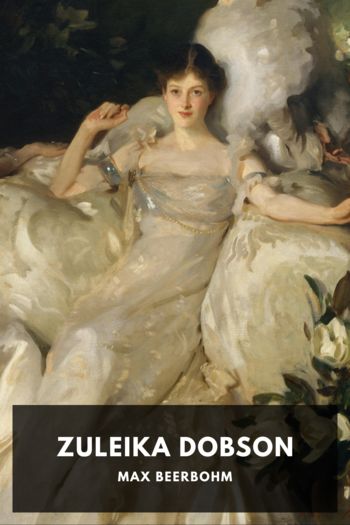The Works of Max Beerbohm - Max Beerbohm (electric book reader .txt) 📗

- Author: Max Beerbohm
Book online «The Works of Max Beerbohm - Max Beerbohm (electric book reader .txt) 📗». Author Max Beerbohm
But since the days when these great critics wrote their treatises, with what gifts innumerable has Artifice been loaded by Science! Many little partitions must be added to the narthecium before it can comprehend all the new cosmetics that have been quietly devised since classical days, and will make the modern toilet chalks away more splendid in its possibilities. A pity that no one has devoted himself to the compiling of a new list; but doubtless all the newest devices are known to the admirable unguentarians of Bond Street, who will impart them to their clients. Our thanks, too, should be given to Science for ridding us of the old danger that was latent in the use of cosmetics. Nowadays they cannot, being purged of any poisonous element, do harm to the skin that they make beautiful. There need be no more sowing the seeds of destruction in the furrows of time, no martyrs to the cause like Maria, Countess of Coventry, that fair dame but infelix, who died, so they relate, from the effect of a poisonous rouge upon her lips. No, we need have no fears now. Artifice will claim not another victim from among her worshippers.
Loveliness shall sit at the toilet, watching her oval face in the oval mirror. Her smooth fingers shall flit among the paints and powder, to tip and mingle them, catch up a pencil, clasp a phial, and whatnot and what not, until the mask of vermeil tinct has been laid aptly, the enamel quite hardened. And, heavens, how she will charm us and ensorcel our eyes! Positively rouge will rob us for a time of all our reason; we shall go mad over masks. Was it not at Capua that they had a whole street where nothing was sold but dyes and unguents? We must have such a street, and, to fill our new Seplasia, our Arcade of the Unguents, all herbs and minerals and live creatures shall give of their substance. The white cliffs of Albion shall be ground to powder for Loveliness, and perfumed by the ghost of many a little violet. The fluffy eider-ducks, that are swimming round the pond, shall lose their feathers, that the powder-puff may be moonlike as it passes over Loveliness’ lovely face. Even the camels shall become ministers of delight, giving many tufts of their hair to be stained in her splendid colour-box, and across her cheek the swift hare’s foot shall fly as of old. The sea shall offer her the phucus, its scarlet weed. We shall spill the blood of mulberries at her bidding. And, as in another period of great ecstasy, a dancing wanton, la belle Aubrey, was crowned upon a church’s lighted altar, so Arsenic, that “greentress’d goddess,” ashamed at length of skulking between the soup of the unpopular and the test-tubes of the Queen’s analyst, shall be exalted to a place of consummate honour upon the toilet-table of Loveliness.
All these things shall come to pass. Times of jolliness and glad indulgence! For Artifice, whom we drove forth, has returned among us, and, though her eyes are red with crying, she is smiling forgiveness. She is kind. Let us dance and be glad, and trip the cockawhoop! Artifice, sweetest exile, is come into her kingdom. Let us dance her a welcome!
Oxford, 1894.
Poor Romeo!Even now Bath glories in his legend, not idly, for he was the most fantastic animal that ever stepped upon her pavement. Were ever a statue given him (and indeed he is worthy of a grotesque in marble), it would be put in Pulteney Street or the Circus. I know that the palm trees of Antigua overshadowed his





Comments (0)